#women's march on Italy
Text

#alessia#1987#oldschool#inked girls#my photos#photoday#girl photography#italy#black tattoo#photoart#sexy tattoed women#tattoed girls#tattoos#style#fashion#blackandwithephotography#black tumblr#eroticlover#inkedandsexy#march#march 2024#love photography#photography#photographers on tumblr#myself#my art
16 notes
·
View notes
Text


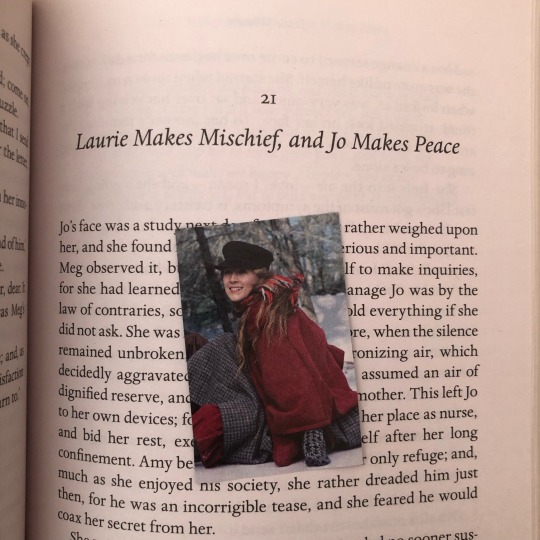



some old days
#sunset#aesthetic sunset#gilmore girls#books#jabbatrooper#visual diary#aesthetic#bookblr#book#book aesthetic#books and reading#little women#jo march#booklover#bookaddict#classic books#sylvia plath#italy aesthetic#flowers#sea#mediterranean sea#italy sea#italian sea#water#clear water#the unabridged journals of sylvia plath#rory gilmore#cereals
5 notes
·
View notes
Photo

1982 and on the occasion of the release of their 16th album, Chicago again tops the Billboard Top Ten chart with an excerpt from this work entitled "Hard to say I'm sorry". The song, as well as the album on which it is featured, was a marked departure from Chicago's traditional soft rock, horn-driven sound, taking on a polished and modern feel. An unforgettable song, a band that has carved their wonderful music forever in our hearts, a song that I would like to dedicate to all the women we should apologize to more often. Love you ❤️ 1982 ed in occasione dell’uscita del loro 16 album i Chicago svettano di nuovo e al più alto scranno nella classifica Top Ten Billboard con un estratto da questo lavoro dal titolo “Hard to say I’m sorry”. La canzone, così come l'album in cui è inclusa, è stata un netto allontanamento dal tradizionale soft rock di Chicago, dal suono guidato dai fiati, assumendo un aspetto raffinato e moderno. Un brano indimenticabile, una band che ha scolpito per sempre nei nostri cuori la loro meravigliosa musica , un brano che vorrei dedicare a tutte le donne a cui dovremmo piu spesso chiedere scusa. Love you❤️ . . #festadelladonna #marzo #mimosa #donne #donna #womensday #woman #festa #love #women #italy #fiori #festadelledonne #march #womanday #italia #like #ig #instagood #auguri #internationalwomensday #madeinitaly #amore #ottomarzo #girlpower #food #party #marcocardelli (presso Ascoli, Marche, Italy) https://www.instagram.com/p/CpiQk7kItFG/?igshid=NGJjMDIxMWI=
#festadelladonna#marzo#mimosa#donne#donna#womensday#woman#festa#love#women#italy#fiori#festadelledonne#march#womanday#italia#like#ig#instagood#auguri#internationalwomensday#madeinitaly#amore#ottomarzo#girlpower#food#party#marcocardelli
0 notes
Note
Please write something with drivers praising female f1 driver during March because it’s womens history month. Anytime something bad happens to her on the grid she’s like someone hitting her car “how could they during womens history month 😞😧”
INTERNATIONAL WOMEN’S DAY

pairings: daniel ricciardo x driver!reader / lewis hamilton x driver!reader / sebastian vettel x driver!reader / small lando cameo
warnings: none?
author’s note: I know it’s not the entire month, but I saw lewis’ post for Stephanie and I couldn’t shake the thought of him making a special post for our gen z driver 🥺 I hope you like it, my darling!
masterlist
• • • • • • •
“Have you seen Daniel’s new post on Insta?” Her performance coach asked her, scrolling through his own phone while they took a break.
Y/N shook her head, not having been on the social media app that day. “No, why?”
“He talks about you.” He grinned, handing his phone over to her with the post ready on the screen.
Daniel had updated his Instagram with a clip of an interview he had done, where he’s asked about which women in his life inspire him.
He starts off by speaking about his grandmothers and their move from Italy to Australia. Daniel also mentions his mother and the support she has given him.
“From an athletic point of view, there’s 2 people that come to mind. My, uh, former colleague and friend, Y/N Y/L,” he laughed, “her entire story on how she came into Formula 1 is very inspiring and she has brought a lot of positive change into the sport,”
“But she’s also a great person and she always has something incredible to say,” Daniel teased his younger friend, “so, yeah, Y/N is definitely an inspiration to me.”
The woman had a soft smile on her face throughout watching the entire video, touched by Daniel’s words.
She gave her coach’s phone back and grabbed her own from her bag, deciding to leave a comment under Daniel’s post.
YourUsername I didn’t even have to force you to say this 😭 thank you, Dan! 💙
A mere hours later, she had seen multiple notifications of people tagging her in a post Lewis had made. She opened the app again and saw an entire post dedicated to her made by the World Champion himself.
lewishamilton Beside Stephanie, I also want to highlight the journey of @/yourusername. I’ve been privileged to watch her make history as the first female driver to stand on a F1 podium, to grab pole position and to win a Grand Prix. Y/N, thank you for all the work you do and continue to do. You use your platform well and I can’t thank you enough for standing by me in the causes that I feel passionate about. I’m excited to continue to follow your journey. Happy #InternationalWomensDay to you, thank you Y/N.
Y/N felt emotional reading Lewis’s message. She had idolized the driver ever since she was a little girl and to have him appreciate and acknowledge her hard work means the world to her.
YourUsername thank you so much, Lewis! 🖤 not you making me cry on international women’s day 😭 this should be illegal
— lewishamilton ❤️
The official F1 Instagram account had also made a post dedicated to the female driver which had been reposted by several drivers on their Instagram stories like George, Carlos, Valtteri, Esteban and even Lando.
The McLaren driver had called her “my goat 🐐” in his caption, something that had made her chuckle.
The best message she had gotten for the special day, came from none other than Sebastian Vettel.
It was a shock to her when the German send her a text message as she hadn’t heard from him in a while, she figured he wanted the time for himself and his loved ones.
SEB VETTEL
Happy International Women’s Day, Y/N! Congratulations on P2 in Bahrain, a great start to the season. I hope you’re doing well and that you had a good winter break!
Today I was reminded of the amazing journey you’ve had since your karting days. I am honored that I have been able to watch you grow as a woman from so close. I’m very proud of you and I’ll keep supporting you, even if I’m not there as much anymore.
I hope you have a great day and I wish you the very best!
Big kiss! X
She send him a message back, thanking him for his beautiful words and asking him how he’s been doing. They send a few texts back and forth, updating each other on their lives.
Y/N also decided to pay a tribute on social media, posting several pictures of herself with the caption:
YourUsername happy international women’s day to myself, cause I’m the best woman I know ❤️🔥
#f1 fic#f1 fics#f1 x reader#formula 1 fic#f1 x oc#lewis hamilton x reader#daniel ricciardo x reader#sebastian vettel x reader
3K notes
·
View notes
Text
stuff that happened in the 2022/2023 football season that should send us into a coma but we’re too desensitized:
1. the whole ass world cup in the middle of the season. what was that
2. manchester united sacking ronaldo and announcing a sale of the club in the middle of the world cup
3. ronaldo getting dropped at the world cup and his replacement scoring a hattrick immediately after
4. keeping up with the belgians (world cup edition)
5. keeping up with the belgians (courtois saying he doesn’t respect kdb after stealing his missus)
6. ronaldo stans beefing with a little moroccan girl
7. the kingdom of saudi arabia buying newcastle united and then telling the premier league that they didn’t and the premier league going “oh okay if you say so”
8. megan thee stallion being romelu lukaku’s date to lautaro martinez’s wedding
9. pique cheating on shakira and then shakira releasing a diss track about it
10. shakira figuring out pique cheated on her because someone ate her strawberry jam and pique doesn’t eat strawberry jam
11. apparently the girl pique cheated on shakira with (clara) cheating on pique with pep
12. wagatha christie libel case
13. real madrid dropping a video accusing barcelona of fascism and the government of cataluyna getting involved
14. the pope coming out as a manchester united fan
15. the one napoli fan that basically made zielinski strip on the pitch
16. mount vesuvius park shutting down because napoli fans wanted to fake an eruption as a celebration
17. frank lampard taking everton into a relegation battle, getting sacked, and then taking chelsea into a relegation battle
18. on that note: chelsea were in a relegation scrap and finished 12th
19. mourinho lost his first ever european final to sevilla europa league black magic
20. whatever the fuck borussia dortmund did on the last day of the bundesliga season
21. anthony martial’s ex wife chasing his first wife down a french motorway with a baby in the passenger seat
22. psg suspending messi because he took an unsanctioned trip to saudi arabia and then unsuspending him two days later because they didn’t want people talking about geopolitics
23. the absolutely bizarre messi apology video released by psg
24. spurs refunding their fans’ tickets after being embarrassing
25. pep’s heartbreak over the fact julia roberts is a manchester united fan
26. chelsea scored one goal in the month of april
27. chelsea and spurs had six managers between them and won one match combined between march and april
28. mourinho fighting anthony taylor after the europa league final
29. milan derby in the ucl for the first time since 2005
30. luis enrique saying he’s cool with the spanish players having sex during the world cup as long as they’re not having orgies
31. luis enrique saying he doesn’t have sex anymore unless his wife wants to
32. man city charged with 115 counts of financial doping and trying to get the barrister in charge disqualified because he’s an arsenal fan
33. mourinho wire-taping himself to catch referees being corrupt
34. ryan reynolds and mac from it’s always sunny in philadelphia buying a football club and that football club getting promoted
35. pele died rip
36. women football awards sponsored by shein and klarna having a category for “male football ally of the year” and it’s just random men that went to one (1) women’s game
37. barcelona negreia case (how do you say calciopoli in catalan?)
38. infantino saying he feels gay, african, like a migrant worker, disabled, arab, and qatari
39. infantino saying he was oppressed as a child because he was ginger and italy is not safe for gingers
40. david alaba’s father in law getting arrested for being one the leaders of a far right group plotting to overthrow the german government
41. richarlison being tumblr’s it girl for a month and then not scoring a goal for the next four
42. juventus being in the middle of another corruption scandal and being docked points because of it
43. two teams getting investigated by the british government for playing football the weekend the queen died
44. gavi getting a yellow card in the first minute of a football match
45. pogba’s brother was arrested by french authorities for being part of a group-organized extortion attempt against pogba
46. richarlison getting a tattoo of neymar’s face and neymar paying him 30k to get it removed
47. iker casillas coming out, puyol implying they had a thing, and both of them retracting it in the most misha collins way possible.
48. sane and mane fight
49. zlatan retired from football
50. barca withholding about 50 million in wages from their players and somehow frenkie still didn’t want to join manchester united
2K notes
·
View notes
Text
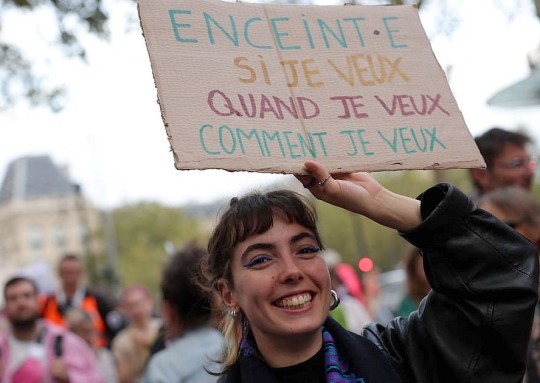
"PREGNANT, IF I WANT, WHEN I WANT, HOW I WANT"
FRANCE BECOMES FIRST COUNTRY TO EXPLICITLY ENSHRINE ABORTION RIGHTS IN CONSTITUTION
The Washington Post | Published March 4, 2024
PARIS — With the endorsement of a specially convened session of lawmakers at Versailles, France on Monday became the first country in the world to explicitly enshrine abortion rights in its constitution — an effort galvanized by the rollback of protections in the United States.
The amendment referring to abortion as a “guaranteed freedom” needed the approval of three-fifths of lawmakers — or 512 votes. The vote result on Monday evening was 780 in favor and 72 against.
“We’re sending a message to all women: your body belongs to you and no one can decide for you,” Prime Minister Gabriel Attal told lawmakers assembled in Versailles.
Thousands of Parisians gathered to watch the proceedings live on a giant television screen at Le Parvis des Droits de l’Homme — or “Human Rights Square” — in central Paris, with the Eiffel Tower looming dramatically over the scene.
Before the political debate began, the television screen showed a montage of women’s rights campaigners around the world holding signs declaring, “My body is mine” and “My body, my choice.” The sound system blared Aretha Franklin’s “Respect.” Parisians driving by honked their horns.
France decriminalized abortion in 1975; abortion is legal for any reason through the 14th week of pregnancy. This amendment won’t change any of that.
But while other countries have inferred abortion rights protections from their constitutions, as the U.S. Supreme Court did in Roe v. Wade, France is the first to explicitly codify in its constitution that abortion rights are protected. France is not interpreting its constitution; it is changing its constitution.
The outcome was “also a promise for all women who fight all over the world for the right to have autonomy over their bodies — in Argentina, in the United States, in Andorra, in Italy, in Hungary, in Poland,” said lawmaker Mathilde Panot, who had introduced the bill in the National Assembly. “This vote today tells them: your struggle is ours, this victory is yours.” People gather near the Eiffel Tower during the broadcast of the special session of Parliament, in Paris on Monday.
425 notes
·
View notes
Note
"gamble" or "quiet"? kissing out where nobody can catch them? - for Jo & Egan, of course, because I live the life of an enabler handing you another juicebox 🧃
You are the best, Killy, and thank you to you and @mercurygray for helping me break my little sick-time writer's block ♡
Bucky Egan/War correspondent OC, also on Ao3!
close to you
She’d gone with Kay back to London for a few days. Enough time to catch herself up, wire the stories she hadn’t already, knock her head against the wall a few more times over what did and didn’t go through. The damn blue slashes. Black ones too. Hell, a woman at the corner newsstand had showed Jo a letter from a boyfriend, cut into the RAF’s version of a paper snowflake. It fluttered strangely in the humid breeze, in the young woman’s hand.
She’d seen Bill March’s broken arm, sustained in some manner during an air raid, though the correspondent still had his usual cheerful smile for her, and the pallbearers carrying a distant cousin of Kay’s out of the church in Marylebone, all of twenty when his ship had been torpedoed off the coast of Italy.
She’d gotten back to Thorpe Abbotts on a Friday afternoon, the air still soupy, her suitcase with a half-broken latch and her bitten nails, a growing hole in her last pair of stockings.
It wasn’t raining. Maybe that counted for something.
Trousers then, and maybe she was optimistic, thinking she felt the air cooling a bit around her. There were small scraps of blue sky, like she’d found them in the bottom of her mother’s rag bin. Calico up in the firmament.
The coffee’s warm, if bitter, she hardly pays attention to that now. A few Clubmobile women cleaning trays in the kitchen take pity on her and sneak her a donut. She dips, sloshes, remembers the good old days of milk and cream, and wanders back outside, wondering if she’d made a mistake in coming here straight from London. Her room is still hers in Norwich. Mrs. Fitzgerald had made sure she knew that. It’s a kindness she doesn’t quite have the words for.
She’ll stay in the Clubmobile quarters tonight, on the extra cot. She’d left a book in Crosby’s care last week and he’d returned it to Tatty Spaatz, a piece of stationery stuck in the middle with neat, if hurried, observations. His handwriting reminds her of Evie’s, the block print of a planner.
“Major Egan will be happy to hear you’re back,” Tatty says, and there’s almost a smile playing at the corner of her mouth, her lipstick the color of red wine.
Jo hardly keeps stone-faced, a little scrunch somewhere between a question and an acknowledgement, distaste and curiosity. “I haven’t seen him,” she says.
They yawn, the seconds between the conversation outside and when he’s walking, seeing her, redirecting his path. His eyes look like he’s been squinting in low light, the mask-marks raw across his cheeks and the bridge of his nose. He’d come out of his office. Post-mission administration, she thinks. Letters home. He writes them longhand, someone had told her. He’s never spoken about it. She’s never asked him.
And she’s not sure happy is the word she’d use, right now. But Tatty knows what she said. Happy is on the ground. A girl smiling at you. The smell of her hair, clean.
The question comes on an exhale, the tie loosened around his neck. “You wanna go for a walk?”
It feels faintly ridiculous, the way she’s not used to being asked. And it’s faintly ridiculous too, the way propriety and a respectful difference between his boots and her lace-up shoes becomes a sneak-around, a glancing journey to the far edge of the airfield, the side of an outbuilding backed by trees.
Maybe he wants something else, she thinks. Another jigger of whiskey, playing cards on the table, chips or dice or jacks. Someone else. Someone who lets him forget.
He kisses her before they’ve even stopped moving, as she rounds the corner in the half-tall grass.
She hasn’t snuck around like this in — god — she can’t remember. Years.
She can’t remember the last time she’s been kissed like this. A sunlit kitchen, softer. Before the leather interiors of fancy cars and class rings. She never thought it could be dressed like this, callused hands and muscle. The flutter of tiny wings falls still. A fly buzzes around their ankles; she can hear it between the sounds of his mouth, breath hot between them.
She can feel that little swatch of damp at the small of her back, the feeling of her hipbones beneath the wool of her trousers. He breaks away to kiss the side of her mouth, the short hairs of his mustache brushing her upper lip.
John, she wants to say, but maybe she can help it, the desperate act of naming him. It all sticks in her throat, like a glob of too-soft caramel. Hardening. John, John, John. “Afternoon, Major.”
He looks like he’s trying to decide something, kisses her again by her nose while he does. She’ll do the same if he’ll let her, the cuts of the oxygen mask and the freckles she can see in the light. “Afternoon, Captain.”
#masters of the air oc#mota oc#john egan x oc#bucky egan x oc#title from listening to the sinatra vdiscs while writing#not to be confused with the carpenters#i mean. you could. it would be fine also.#i've had a really fun cold for the better part of a week so this may be a little....interesting. but i'm feeling a lot better!#hope people enjoy <3#motaverse#jo's tag#anyway!#shoshi writes
57 notes
·
View notes
Text
Pretty Coincidences (Part One)
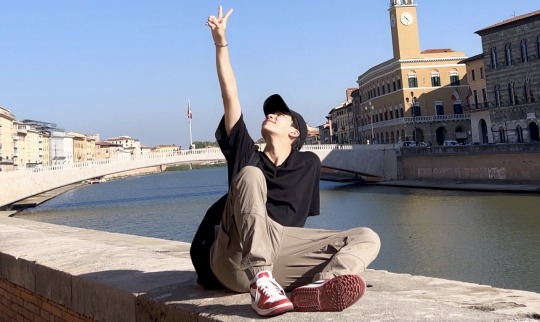
Pairing: Yoon Jeonghan x Fem!Reader
Word Count: 2.8K
Warnings: Strangers to ??? AU, angst, mentions of cheating, mentions of plane crashes, swearing
Summary: Choosing to run away from your problems on an impromptu trip to Italy may be the best decision you’ve made in your life thus far.
A/N: a belated birthday fic for the beautiful Jeonghan and also a belated birthday fic for my fave Carat friend Zan 💜
Masterlist
Part Two?

To say you were heartbroken was an understatement.
You feel almost dead inside as you sit in the backseat of your Uber, unshed tears tempting you to break the flood gates. How the fuck did you get here, in an Uber on the way to Incheon Airport running away from your responsibilities and problems?
The answer was Geumjae.
Forty eight hours ago, you were happy. You were happy and in love with your seemingly loving boyfriend of four years, Geumjae, in the talks of buying an apartment together and Geumjae planning to pop the question to you this coming Christmas in front of both your families. That was, until, you decided to take the afternoon off from your office job, feeling unwell and in all honesty, wanted the comfort of your boyfriend and your bed.
Instead of finding your loving boyfriend making soup for you in your apartment, you were greeted to the sounds of aggressive lovemaking coming from your personal bedroom. That scumbag was using YOUR bed in YOUR apartment to sleep with other women?! No fucking way.
Now, you’re not a pushover or a pussy. On the contrary, you proved to yourself that you’re the opposite; storming into your bedroom and throwing out your new ex boyfriend and his flimsy little side-piece, who you vaguely recognized as your now ex-best friend, who was trying to stammer some sort of apology. You didn’t hear her as she spoke though, only throwing both him and her out of your apartment with nothing but the clothes on their backs, which at that moment, was none at all, leaving them to rush to his car as quick as possible without being seen, as you curled up on the living room floor in hysterics.
After a long night of tears, a whole tub of ice cream, half a bottle of wine and burnt clothes, photos and bedsheets, at the ripe time of 2:43am, you feel the sadness within you seep into a seething anger.
Screw this guy! You don’t need him! You can do a lot better and deserve someone who will love and treat you right! Who else can treat you better than yourself?
In a half-tipsy wine drunk state, you grab your laptop and start typing travel options in your search bar.
You had always dreamed of wanting to go on a trip to see Italy ever since you met Geumjae, and for four long draining years, your requests were always rebuffed with a ‘I can’t afford it’ or ‘why don’t we try local?’ Well screw that. You’re newly free and have the funds saved, as well as PTO from your job. After sending a long and misspelled message to your boss, you rise from your spot on the floor to march into your room to pack your bags.
Forty eight hours later, you were miserable, angry and betrayed by two of the closest people you know, but you also felt surprisingly free, as if a weight had been lifted off your chest as you stepped inside Incheon Airport to make your way to your flight to Italy.
You settle into your seat with a tired sigh. For once, you’re actually happy you got seated in an Emergency Exit row. You’re not as enclosed as the others which means more leg room, and instead of having two people beside you, you only have one. Double win. The less people you have to interact with, the better. You hope that the unlucky person who was destined to be sat beside you isn’t a talker; hopefully they are just as tired and done with the world as you.
You take a quick glance at your reflection from your front facing phone camera, wincing at the miserable girl you faced. Your hair is pulled back into a ponytail, several strands having found their way out of the loose hair tie securing your locks and falling over your shoulders haphazardly. You have massive bags under your eyes, which isn’t surprising since you have barely slept since you found your trash ex. You hope that you’ll be able to catch up on your sleep during the twelve hour flight to Italy.
After heaving another sleepy sigh, you lift your head to the side to see a hooded figure placing a bag into the overhead locker before sitting down carefully beside you and pulling his hood back to ruffle his fluffed up hair out of his eyes. Your cheeks tinge a dusty pink as you take in the mystery man’s handsome good looks, suddenly feeling self conscious at your appearance. After giving the gorgeous man a small smile in greeting, (which he returns without hesitation) you shrink slightly into your seat, your brain beginning to work overtime as you feel an overwhelming urge to apologize about your half assed looks. The man is in an almost identical outfit to yours, but you can’t help but resent your new seatmate at how much better he looks than you. Then again, he probably hasn’t had his heart ripped out of his chest and then stomped on by his ex-girlfriend within the last two days. You were so consumed in your own self deprecating thoughts you didn’t notice the pretty man looking at you expectantly.
“Sorry, did you say something?” You blink, eyes wide.
“That’s okay.” The man smiles. You blush. Dang, why did he have to be so pretty? “I was just asking if you had enough room there.” He gestures to the armrest between you both. “I can scoot over a little bit if you need.”
“O-oh.” You stutter, shaking your head quickly. “No, you’re fine, really.”
“Are you sure?”
“Mhm.” You nod, giving him a little smile. “I will apologize in advance though, I am 100% going to sleep for this flight.”
“Damn,” he sighs dramatically. You tilt your head in questioning. “You’re going to sleep and let me be the only one to have to save the plane and all these passengers if a disaster happens?”
You’re caught off guard as a giggle passes your lips, your smile growing as the man chuckles with you. You didn’t know how badly you needed to have a laugh.
“I do apologize,” you hum. “But getting my beauty rest is more important than the well-being of the plane.”
It’s the stranger’s turn to laugh along with you, and you feel relieved that the joke lands.
“Hmm, I’ll keep that in mind.” He nods thoughtfully. “Did you need to be woken from your beauty rest when the meals come by?”
You blink in surprise. How thoughtful. “Uhh.. if it’s no trouble?”
“None at all.” He’s surprisingly chirpy at this hour of the morning. “We are the backbone of this flight. We need to keep our strength up.” He winks at you and smiles as you laugh again.
“Fair point.” You nod gently as you fasten your seatbelt, the flight crew beginning to prepare you for takeoff.
You wait for a moment to see if Pretty Man will continue the conversation, but when he settles in and starts looking for movies on his tv, you let your eyes flutter shut, sleep taking over you before you even feel the plane take off.
You feel yourself being shaken gently an hour later as you stir, rubbing at your eyes with a little yawn. Pretty Man is smiling warmly at you.
“Hey.” He mumbles. “Sorry, they’re giving out breakfast.”
“S’fine.” You yawn again, smiling politely at the flight attendant as she passes your meal over. “Thanks for waking me, uhh..”
“Jeonghan.” Pretty Man - Jeonghan offers, and you nod with a little smile. “You’re welcome…”
“Y/N.”

Your eyes open slowly, yawning out as you start to take in your surroundings around you, the PA system announcing that the descent into Rome will begin within the hour. You sit up slightly and run at your eyes tiredly. Your eyelids still feel heavy, but after having slept for a solid 10 hours, only having been woken up from Jeonghan to eat in between with minimal conversation, you feel like you’ve rested enough.
“Did you manage to keep the plane in one piece while I slept?” You joke, Jeonghan chuckling in response.
“Only barely.” He sighed dramatically, hand on his chest. “I think you owe me for the next flight.”
“I think I do.” You humor him as he laughed.
“So, what brings you to Italy?” He asks after a moment of silence as you glance out the little window beside you.
“Mid-life crisis?” You offer with a laugh. Jeonghan only raises his eyebrows in concern. “Long story short,” you start fiddling with your fingers, nibbling your lip. “Just got out of a long term relationship and I’m long overdue for a holiday. So, I just packed up and left for Rome to forget about the real world for a while.” You wince, not even looking at Jeonghan to know that he’s giving you a look of pure pity.
“Wow, I’m sorry to hear that.” He frowns.
“Ah, it’s fine.” You shrug. It wasn’t. Not in the slightest. “Was probably for the best.” You’re lying, you know you are. “What about you?”
“Ah,” he rubs at the back of his neck. “A friend of mine offered for me to go on a trip here with him. He flew out a few days ago, so I’m meeting him here.”
“That sounds exciting.” You smile as he hums in agreement.
“Definitely.” He smiles back. “Well, I hope that Rome treats you well.”
You hope it does too. “You too.”

It could just be your excitement, but you truly think that the Italian air is just as healing to you as the place itself. After parting ways with Jeonghan and making your way to your hotel right in the middle of the bustling city of Rome, you think you can feel the cracks in your heart begin to heal, if only slightly.
You take in a deep breath as you walk along the pavement that runs through the city of Rome, taking in the sights of small local stalls selling jewelry and knickknacks, a content smile on your face. You’ve been here for only a day but you feel more like yourself than you have been for the last four tiring years. You adjust the strap of your handbag over your shoulder, fixing the sleeve of your flowy floral dress as you let the sunshine warm your body. Your phone has been left behind in the hotel room, having been blown up since you have landed in the foreign country from your ex. The messages were deleted as soon as they were received and the numbers have been swiftly blocked by you, only providing updates to your parents and your boss that you arrived safely and you will contact them if anything new happens.
You lift the disposable camera that sits around your neck by a strap up to your face, snapping a quick photo of a gelato stand on the corner, your smile growing as your stomach rumbles. You could use something sweet.
“Buongiorno,” you speak quietly, stepping up to the man behind the gelato stand. The man smiles back at you as you take a nervous breath. “Uhh… vorrei un gelato piccolo in cono, per favore.” You smile hopefully, hoping that you didn’t just accidentally insult him.
You release a breath as the man smiles happily at you, leaning down as he begins to take out a cone and ice cream scoop, making your gelato with precision.
“Grazie!” You beam as you pass him your money, taking the cone gratefully. You bow your head in thanks to further show your appreciation, and the man chuckles, bowing his head back.
As you turn, you let out a yelp as you run into a body behind you, almost causing you to drop your new cold treat. Luckily, you’re able to compose yourself quickly and bow your head just as fast.
“I’m so sorry!” You pause before your brain catches up. “U-uhh.. m-mi scusi!”
“Y/N? Is that you?” A soft voice responds, and you freeze.
You lift your head quickly to the owner of the voice, your eyes widening as you see an all too familiar face smiling excitedly at you. His chestnut brown hair is pushed back, his bright smile being just as blinding as when you first met him all those years ago in middle school, who went on to be your good friend for five years before life caught up with you and you naturally drifted apart.
“Seokmin? Lee Seokmin?” Your smile grows with him as he almost immediately scoops you up into his arms, spinning you around in circles. You squeal out a laugh, your free hand holding onto his shoulder. “Yah!”
“What the heck?!” He laughs with you, squeezing you tight once he places you back onto the ground. “What are you doing here?!”
“I could ask you the same thing!” You giggle happily.
“I’m on a trip with a hyung of mine! We both had some time off and wanted to go somewhere warmer.” He chirps, looking you over with a smile. “What about you? Where’s Geumjae?”
You freeze at the mention of his name, biting down on your lip. “Um.. I’m here alone, actually.” You attempt to smile, but it looks more like a grimace. “We broke up. Not too long ago actually and messy. So, I guess this is my way of coping.” You shrug.
“Oh no, I’m sorry I brought it up.” He pouts, rubbing your arm comfortingly. “So you’re here alone?”
“Yep.” You pop the P with a little smile. “But it’s only my second day here and I’m happier than I have been in the last four years, so that’s a plus.”
“I’m glad.” He smiles warmly at you as you nod.
“Dokyeom-ah!” A second voice enters the conversation. “What’s taking so long?”
You turn your head and take a step back with wide eyes as you come face to face with Pretty Man; Jeonghan. He looks more put together than you both did at the airport; now sporting a pair of black skinny jeans with a plain white t-shirt and a leather checkered jacket. He looks just as surprised as you do, taking in your outfit.
“Sorry hyung,” Seokmin smiles, his arm wrapping around your shoulders as you hold your cone now with both hands. “I ran into a friend from school! Hyung, this is-”
“Y/N. The one who left me to fend for myself to save the plane all on my own.” He sighs and places his hand on his chest.
“That was you?” Seokmin gasps.
“Yah!” You glare playfully. “You said it was okay!”
“I only said that to make you feel better about the fact that you willingly let me save us all.”
“It was one bout of turbulence.” You huff before Jeonghan smirks playfully at you. “I won’t keep you guys, you probably are waiting to get some gelato.”
“What? Are you sure?” Seokmin frowns. “You can tag along with us if you wanted, I’m sure hyung wouldn’t mind?”
“No, it’s okay, really.” You give him a little smile. Jeonghan frowns. He can see right through it.
“You’re just going to walk around by yourself?”
“You say that like I haven’t done it before, Min.” You laugh.
“I mean, yeah, you did it on campus but… you’re in a whole new country. I think I’d feel a lot better if you had at least one friend to keep you company.” He insists.
You hesitate, biting down on your lip. He does make a good point.
“How about this,” Seokmin offers. “You don’t have to spend every day with us. Why don’t we meet up once a day? I can take some great photos for your Instagram to show Geumjae that you’re thriving without him.”
“Geumjae?” Jeonghan tilts his head. Your face turns red.
“The Ex-boyfriend.” You hum, looking down.
“He never deserved you.” Seokmin rubs at your shoulders comfortingly as he sees the dismay on your face.
“Ah, thanks Min.” You smile. “I’ll take you up on that offer, only if it’s okay with you and Jeonghan. I don’t want to intrude.”
“You could never. You’re always welcome. Right, Hyung?”
“Of course.” Jeonghan nods with a smile at you.
“Thank you guys.”
“It’s no sweat, really! The more the merrier!” Seokmin beams. “We’re going to the Trevi tomorrow if you want to meet us there?”
“Sounds good.” You hum, waving your hand. “I’ll message you?”
“Sure.” He nods as you begin to walk away.
“See you then.”
As soon as you’re out of sight, Seokmin turns towards Jeonghan with raised eyebrows.
“Ohh Dokyeom-ah,” Seokmin mocks Jeonghan. He starts to blush. “I swear I made her laugh. She was just too cute.”
“Shut up.” He grumbles, glaring at the younger man.
“I can’t believe my school pal is the Cute Girl from your flight.”
“I said shut up.” He hissed. Seokmin just smirked at him with a giggle.
#seventeen au#seventeen fluff#seventeen angst#yoon Jeonghan x reader#Jeonghan x reader#Jeonghan angst#Jeonghan fluff#seventeen fanfic#seventeen x reader
137 notes
·
View notes
Text
I congratulate all beautiful ladies on Women's Day on March 8! I wish you to stay beautiful and continue to smell like a bouquet of beautiful flowers.
As a gift I give you Italy
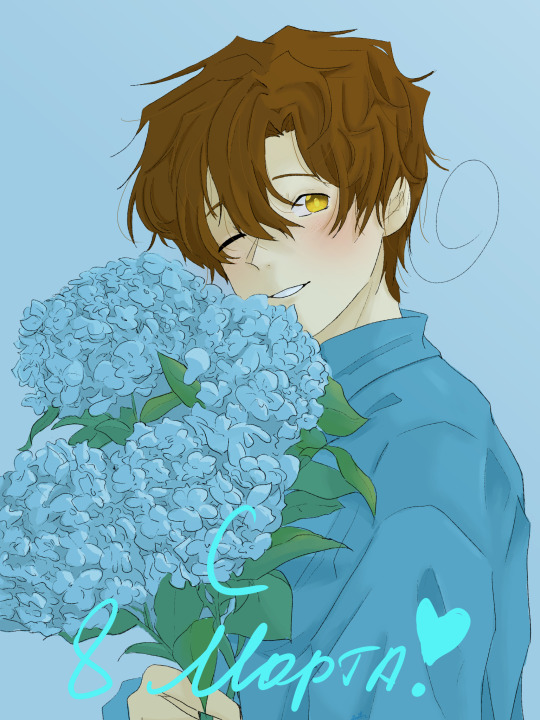

62 notes
·
View notes
Photo

On this day, 18 April 1945 workers in Turin, Italy, walked out on strike in protest at Nazi Germany occupation. Workers and resistance fighters distributed leaflets the previous night calling for a walkout. On the morning of April 18, factories, workshops, shops, markets, schools, transport and postal and telephone services were all shut down. Some workers, like at Fiat Mirafiori, occupied their plants, while thousands of others took to the streets. A huge march went through Piazza Sabotino, headed by women carrying Italian flags and placards, calling on the fascists to surrender, and singing the "Red Flag". One eyewitness, Giorgio Amendola, reported: "What impressed me was the confidence of the crowd, the firm and serene courage and an air of celebration and joy, everyone was happy and seemed to be saying: you see how strong we are. The fascists did not show up. In fact, the whole neighborhood was in our hands". Just over a week later, on April 27, partisans entered the city and by the following day the last remaining fascist troops had fled. We are currently producing a podcast miniseries about the partisan resistance in Italy, in conversation with surviving participants. You can get first listen, and help support our work like this by joining us on patreon. This helps us fund our work like producing the podcast, funding translation and transcription, purchasing research materials and so on. Learn more, sign up and get access to exclusive content at https://patreon.com/workingclasshistory Pictured: partisans in Turin around this time https://www.facebook.com/photo.php?fbid=611190447720841&set=a.602588028581083&type=3
230 notes
·
View notes
Photo
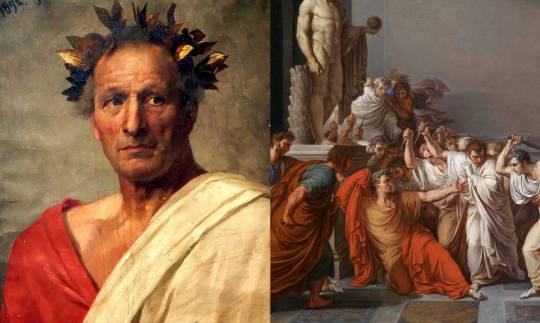
The Ides of March. On March 15,44 BC, Julius Caesar was assassinated.
We owe Julius Caesar the famous phrase “the die is cast” (Alea iacta est). He said this in January 49 BC when he led his army across the Rubicon River in northern Italy, after his conquest of Gaul. A positive aspect of him is that he did not seek revenge. He spared the lives of his enemies defeated in the civil war with the intention of turning them into friends and together improving what he called "the new Republic." Among his murderers on that Ides of March were those "friends" whose lives he had spared.
In 59 BC he founded Florentia which later changed its name in Italian to Firenze (Florence). The curious, almost prophetic thing is that Florentia in Latin means “flowering” and it was in Florence that the cultural movement known as the Renaissance (a flowering of art) emerged.
In 46 BC he modified the Roman calendar, creating the novelty that the year began on January 1 and not March 1 as in the previous calendar in addition to the novelty of the leap year.
Julius Caesar, one of the most famous men, had a passionate relationship with one of the most famous women, the Ptolemaic Egyptian queen Cleopatra VII. They had a son, named Caesarion. After Cleopatra's arrival in Rome in the year 46, Caesar himself officially recognized the child as his son.
He had a daughter named Julia, whom Caesar married to Pompey Magnus, who would later be his greatest rival and whom he defeated during the civil war at the Battle of Pharsalia. Julia and the baby died during childbirth. Caesar adopted his grandnephew, Octavian as his son and sole heir. Years later, Octavian ordered the execution of young Caesarion, days after Cleopatra committed suicide.
Caesar proclaimed himself Dictator for 10 years, something completely unusual. The position of Dictator was an occasion in which a man was elected by the Senate for a period of 6 months to 1 year to make special laws, in times of war or serious crisis. In addition to the calendar,Julius Caesar has also forever changed the meaning of being a Dictator.

He became a dictator in the modern sense of the word: he was populist, he did things to please the Roman people to the point that they idolized him. Although it must be recognized that he did very favorable things for the people.
Shortly after, he proclaimed himself Dictator for life, this sealed his tragic end.
Senators agreed to assassinate him.The conspiracy was carried out in the house of Servilia ,mother of Brutus and lover of Julius Caesar for years.
They stabbed him 23 times, taking him by surprise in the Senate.

After years of civil war caused by this assassination, his grandnephew Octavian,Caesar Augustus, became the first Emperor of Rome. Unlike his uncle and adoptive father, Octavian was very vengeful; Within a few years, all of Caesar's adversaries and assassins were dead.
Historians agree that with exceptions, such as Cato, Cicero, Brutus or Cassius,who sincerely believed that the Republic was in danger, the others did not decide to assassinate him out of fear of a monarchy, as they hypocritically claimed, but out of envy and ambition; They did not want to be republicans, they wanted to be JULIUS CAESAR, the same desire of every authoritarian ruler from then to the present.
349 notes
·
View notes
Text




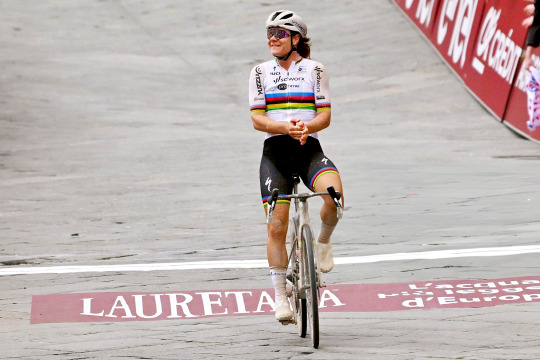


Lotte Kopecky of Belgium and Team SD Worx-Protime celebrates at finish line as race winner during the 10th Strade Bianche 2024, Women's Elite a 137km one day race from Siena to Siena on March 02, 2024 in Siena, Italy. (Photos by Luc Claessen/Getty Images)
#lotte kopecky#team sd worx protime#women cycling#cycling#strade bianche donne#strade bianche donne 2024
23 notes
·
View notes
Text
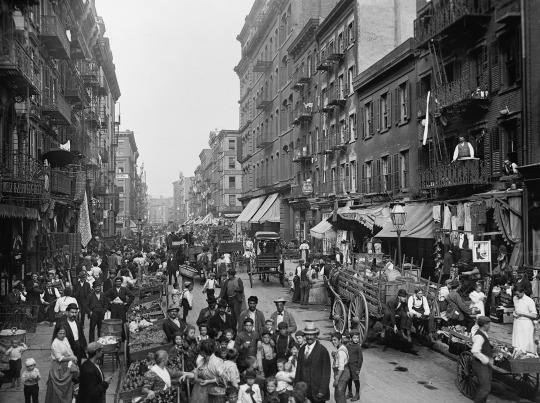
How Italians Became ‘White’
Congress envisioned a white, Protestant and culturally homogeneous America when it declared in 1790 that only “free white persons, who have, or shall migrate into the United States” were eligible to become naturalized citizens. The calculus of racism underwent swift revision when waves of culturally diverse immigrants from the far corners of Europe changed the face of the country.
As the historian Matthew Frye Jacobson shows in his immigrant history “Whiteness of a Different Color,” the surge of newcomers engendered a national panic and led Americans to adopt a more restrictive, politicized view of how whiteness was to be allocated. Journalists, politicians, social scientists and immigration officials embraced the habit, separating ostensibly white Europeans into “races.” Some were designated “whiter” — and more worthy of citizenship — than others, while some were ranked as too close to blackness to be socially redeemable. The story of how Italian immigrants went from racialized pariah status in the 19th century to white Americans in good standing in the 20th offers a window onto the alchemy through which race is constructed in the United States, and how racial hierarchies can sometimes change.
Darker skinned southern Italians endured the penalties of blackness on both sides of the Atlantic. In Italy, Northerners had long held that Southerners — particularly Sicilians — were an “uncivilized” and racially inferior people, too obviously African to be part of Europe.
Racist dogma about Southern Italians found fertile soil in the United States. As the historian Jennifer Guglielmo writes, the newcomers encountered waves of books, magazines and newspapers that “bombarded Americans with images of Italians as racially suspect.” They were sometimes shut out of schools, movie houses and labor unions, or consigned to church pews set aside for black people. They were described in the press as “swarthy,” “kinky haired” members of a criminal race and derided in the streets with epithets like “dago,” “guinea” — a term of derision applied to enslaved Africans and their descendants — and more familiarly racist insults like “white nigger” and “nigger wop.”

The penalties of blackness went well beyond name-calling in the apartheid South. Italians who had come to the country as “free white persons” were often marked as black because they accepted “black” jobs in the Louisiana sugar fields or because they chose to live among African-Americans. This left them vulnerable to marauding mobs like the ones that hanged, shot, dismembered or burned alive thousands of black men, women and children across the South.
The federal holiday honoring the Italian explorer Christopher Columbus — celebrated on Monday — was central to the process through which Italian-Americans were fully ratified as white during the 20th century. The rationale for the holiday was steeped in myth, and allowed Italian-Americans to write a laudatory portrait of themselves into the civic record.
Few who march in Columbus Day parades or recount the tale of Columbus’s voyage from Europe to the New World are aware of how the holiday came about or that President Benjamin Harrison proclaimed it as a one-time national celebration in 1892 — in the wake of a bloody New Orleans lynching that took the lives of 11 Italian immigrants. The proclamation was part of a broader attempt to quiet outrage among Italian-Americans, and a diplomatic blowup over the murders that brought Italy and the United States to the brink of war.
Historians have recently showed that America’s dishonorable response to this barbaric event was partly conditioned by racist stereotypes about Italians promulgated in Northern newspapers like The Times. A striking analysis by Charles Seguin, a sociologist at Pennsylvania State University, and Sabrina Nardin, a doctoral student at the University of Arizona, shows that the protests lodged by the Italian government inspired something that had failed to coalesce around the brave African-American newspaper editor and anti-lynching campaigner Ida B. Wells — a broad anti-lynching effort.
A Black ‘Brute’ Lynched
The lynchings of Italians came at a time when newspapers in the South had established the gory convention of advertising the far more numerous public murders of African-Americans in advance — to attract large crowds — and justifying the killings by labeling the victims “brutes,” “fiends,” “ravishers,” “born criminals” or “troublesome Negroes.” Even high-minded news organizations that claimed to abhor the practice legitimized lynching by trafficking in racist stereotypes about its victims.
As Mr. Seguin recently showed, many Northern newspapers were “just as complicit” in justifying mob violence as their Southern counterparts. For its part, The Times made repeated use of the headline “A Brutal Negro Lynched,” presuming the victims’ guilt and branding them as congenital criminals. Lynchings of black men in the South were often based on fabricated accusations of sexual assault. As the Equal Justice Initiative explained in its 2015 report on lynching in America, a rape charge could occur in the absence of an actual victim and might arise from minor violations of the social code — like complimenting a white woman on her appearance or even bumping into her on the street.
The Times was not owned by the family that controls it today when it dismissed Ida B. Wells as a “slanderous and nasty-minded mulattress” for rightly describing rape allegations as “a thread bare lie” that Southerners used against black men who had consensual sexual relationships with white women. Nevertheless, as a Times editorialist of nearly 30 years standing — and a student of the institution’s history — I am outraged and appalled by the nakedly racist treatment my 19th-century predecessors displayed in writing about African-Americans and Italian immigrants.
When Wells took her anti-lynching campaign to England in the 1890s, Times editors rebuked her for representing “black brutes” abroad in an editorial that joked about what they described as “the practice of roasting Negro ravishers alive and boring out their eyes with red-hot pokers.” The editorial slandered African-Americans generally, referring to rape as “a crime to which Negroes are particularly prone.” The Times editors may have lodged objections to lynching — but they did so in a rhetoric firmly rooted in white supremacy.
‘Assassins by Nature’
Italian immigrants were welcomed into Louisiana after the Civil War, when the planter class was in desperate need of cheap labor to replace newly emancipated black people, who were leaving backbreaking jobs in the fields for more gainful employment.
These Italians seemed at first to be the answer to both the labor shortage and the increasingly pressing quest for settlers who would support white domination in the emerging Jim Crow state. Louisiana’s romance with Italian labor began to sour when the new immigrants balked at low wages and dismal working conditions.
The newcomers also chose to live together in Italian neighborhoods, where they spoke their native tongue, preserved Italian customs and developed successful businesses that catered to African-Americans, with whom they fraternized and intermarried. In time, this proximity to blackness would lead white Southerners to view Sicilians, in particular, as not fully white and to see them as eligible for persecution — including lynching — that had customarily been imposed on African-Americans.

https://static01.nyt.com/newsgraphics/2019/10/10/srw1011-staplesgallery/4792c59ca6f516c487b724c1c77fd4899b3050d3/photo_cat.jpg
Nevertheless, as the historian Jessica Barbata Jackson showed recently in the journal Louisiana History, Italian newcomers were still well thought of in New Orleans in the 1870s when negative stereotypes were being established in the Northern press.
The Times, for instance, described them as bandits and members of the criminal classes who were “wretchedly poor and unskilled,” “starving and wholly destitute.” The stereotype about inborn criminality is plainly evident in an 1874 story about Italian immigrants seeking vaccinations that refers to one immigrant as a “burly fellow, whose appearance was like that of the traditional brigand of the Abruzzi.”
A Times story in 1880 described immigrants, including Italians, as “links in a descending chain of evolution.” These characterizations reached a defamatory crescendo in an 1882 editorial that appeared under the headline “Our Future Citizens.” The editors wrote:
“There has never been since New York was founded so low and ignorant a class among the immigrants who poured in here as the Southern Italians who have been crowding our docks during the past year.”
The editors reserved their worst invective for Italian immigrant children, whom they described as “utterly unfit — ragged, filthy, and verminous as they were — to be placed in the public primary schools among the decent children of American mechanics.”
The racist myth that African-Americans and Sicilians were both innately criminal drove an 1887 Times story about a lynching victim in Mississippi whose name was given as “Dago Joe” — “dago” being a slur directed at Italian and Spanish-speaking immigrants. The victim was described as a “half breed” who “was the son of a Sicilian father and a mulatto mother, and had the worst characteristics of both races in his makeup. He was cunning, treacherous and cruel, and was regarded in the community where he lived as an assassin by nature.”
Sicilians as ‘Rattlesnakes’
The carnage in New Orleans was set in motion in the fall of 1890, when the city’s popular police chief, David Hennessy, was assassinated on his way home one evening. Hennessy had no shortage of enemies. The historian John V. Baiamonte Jr. writes that he had once been tried for murder in connection with the killing of a professional rival. He is also said to have been involved in a feud between two Italian businessmen. On the strength of a clearly suspect witness who claimed to hear Mr. Hennessy say that “dagoes” had shot him, the city charged 19 Italians with complicity in the chief’s murder.
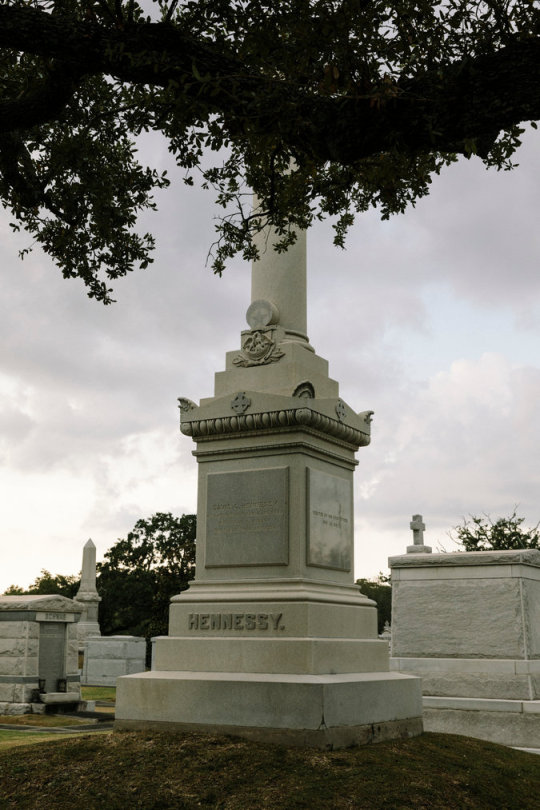
The monument to David Hennessy rises above nearly all
the other tombs in Metairie Cemetery in New Orleans.William Widmer for The New York Times
That the evidence was distressingly weak was evident from the verdicts that were swiftly handed down: Of the first nine to be tried, six were acquitted; three others were granted mistrials. The leaders of the mob that then went after them advertised their plans in advance, knowing full well that the city’s elites — who coveted the businesses the Italians had built or hated the Italians for fraternizing with African-Americans — would never seek justice for the dead. After the lynching, a grand jury investigation pronounced the killings praiseworthy, turning that inquiry into what the historian Barbara Botein describes as “possibly one of the greatest whitewashes in American history.”
The blood of the New Orleans victims was scarcely dry when The Times published a cheerleading news story — “Chief Hennessy Avenged: Eleven of his Italian Assassins Lynched by a Mob” — that reveled in the bloody details. It reported that the mob had consisted “mostly of the best element” of New Orleans society. The following day, a scabrous Times editorial justified the lynching — and dehumanized the dead, with by-now-familiar racist stereotypes.
“These sneaking and cowardly Sicilians,” the editors wrote, “the descendants of bandits and assassins, who have transported to this country the lawless passions, the cutthroat practices … are to us a pest without mitigations. Our own rattlesnakes are as good citizens as they. Our own murderers are men of feeling and nobility compared to them.” The editors concluded of the lynching that it would be difficult to find “one individual who would confess that privately he deplores it very much.”

Lynchers in 1891 storming the New Orleans city jail, where they killed 11 Italian-Americans accused in the fatal shooting of Chief Hennessy.Italian Tribune
President Harrison would have ignored the New Orleans carnage had the victims been black. But the Italian government made that impossible. It broke off diplomatic relations and demanded an indemnity that the Harrison administration paid. Harrison even called on Congress in his 1891 State of the Union to protect foreign nationals — though not black Americans — from mob violence.
Harrison’s Columbus Day proclamation in 1892 opened the door for Italian-Americans to write themselves into the American origin story, in a fashion that piled myth upon myth. As the historian Danielle Battisti shows in “Whom We Shall Welcome,” they rewrote history by casting Columbus as “the first immigrant” — even though he never set foot in North America and never immigrated anywhere (except possibly to Spain), and even though the United States did not exist as a nation during his 15th-century voyage. The mythologizing, carried out over many decades, granted Italian-Americans “a formative role in the nation-building narrative.” It also tied Italian-Americans closely to the paternalistic assertion, still heard today, that Columbus “discovered” a continent that was already inhabited by Native Americans.
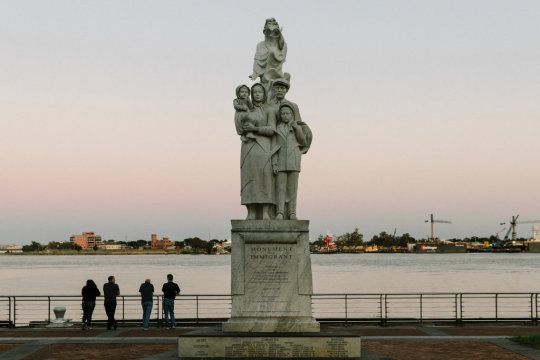
The “Monument to the Immigrant,” commissioned by the Italian American Marching Club of New Orleans, stands along the Mississippi River in Woldenberg Park.William Widmer for The New York Times
But in the late 19th century, the full-blown Columbus myth was yet to come. The New Orleans lynching solidified a defamatory view of Italians generally, and Sicilians in particular, as irredeemable criminals who represented a danger to the nation. The influential anti-immigrant racist Representative Henry Cabot Lodge of Massachusetts, soon to join the United States Senate, quickly appropriated the event. He argued that a lack of confidence in juries, not mob violence, had been the real problem in New Orleans. “Lawlessness and lynching are evil things,” he wrote, “but a popular belief that juries cannot be trusted is even worse.”
Facts aside, Lodge argued, beliefs about immigrants were in themselves sufficient to warrant higher barriers to immigration. Congress ratified that notion during the 1920s, curtailing Italian immigration on racial grounds, even though Italians were legally white, with all of the rights whiteness entailed.
The Italian-Americans who labored in the campaign that overturned racist immigration restrictions in 1965 used the romantic fictions built up around Columbus to political advantage. This shows yet again how racial categories that people mistakenly view as matters of biology grow out of highly politicized myth making.

#italians#sicily italy#wop#african#afrakan#kemetic dreams#brownskin#afrakans#africans#brown skin#congress#new orleans lynching#new orleans#massachusetts#european#europeans#how italians became white#becoming white#white people#white#white culture#western europe
103 notes
·
View notes
Photo
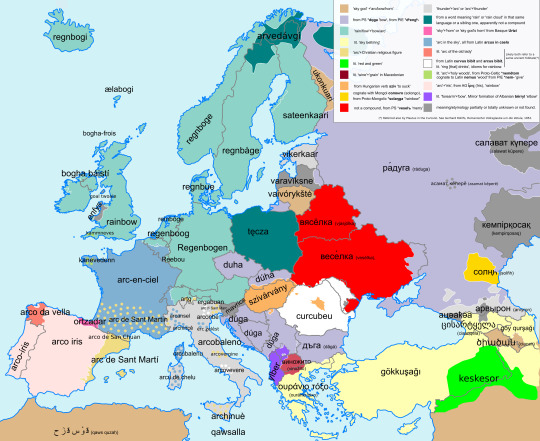
Meaning of the stems of the words for "rainbow" in the languages of Europe.
by u/nickanc
'Rainbow' is typically a compound word in most European languages. Generally, speaking, a part of the word comes from words meaning bow, belt, ring, circle or arc in their respective languages or ancestor languages. The other one varies and is the main concern of this work.
Some incomplete notes on the meanings and the etymologies I gathered while making the map:
'sky god' + 'arc/bow':
Arabic from Quzah, a pre-islamic deity of weather
Maltese from Maltese alla 'god', from Allah, the islamic deity,
Karelian from Ukko, Finnic sky god
Lithuanian from Vaiva, goddess of Baltic mythology
Armenian is uncertain, supposed to derive ultimately from PIE *dyew- 'shine'
from PS *dǫga "bow". they all are not compounds, except maybe for Russian
'rain/flow'+'bow/arc':
Germanic ones but faroese from PG *regnaburô 'rainbow' obvious compound, *burô comes from PIE *bhewgh-
Faroese æla means shower (as in weather), formerly "flow quickly", from PG *ēlaz "eel"
Finnish from Proto-Finnic *satadak "fall, rain"
Irish and Scot Gaelic are compound words in their very language, there are many other interesting Irish words.
'arc of the old lady' and 'circus bibit', 'arcus bibit'. In some ancient folklore tales, that appear in various IE families, various weather phenomena are especially linked with magical or religious figures that assume the form of old ladies. In Italian and Romanian folklore there are the 'giorni della vecchia'/'zilele babelor' that are the days 29th-31st of March, when the cold is expected to return. In Romania an old lady is Baba Dochia that brings forth the spring and various other Babele populate the Romanian folklore; in the Gallo-italic folklore of Italy there is a folklore fog spirit named Borda that is an old lady personifying the fog, Gaelic mythology has its weather old lady Cailleach, the Indian summer is called in German Altweibersommer lit. 'old women's summer'. The rainbow is no exception: Plautus in the Curculio hints at a folktale of an old lady that drinks "like" the rainbow does or maybe is the rainbow itself, hence also other etymologies for rainbow related to expressions like "circus bibit", "arcus bibit", "arcus imbibens" etc.that give etymologies in various languages. Venetian arcombé and Ladin ergabuan come from arcus imbibiens (source), whereas Romanian curcubeu likely from curvus bibit and Neapolitan arcovevere from arcus bibit. Note that expressions containing the rainbow and the old lady or the act of drinking exist in many languages in this map and their dialects, just they are not the common word for rainbow. For example, in Moldovan there is brîul babei that means 'rainbow' (source), Slovenia has the dialectal word pijâvka 'rainbow' from PS *piti 'to drink', while in Spain and Portugal dialectal expressions that are cognates of the Galician one are apparently common, in Czech there is an idiom pije jak duha that means 'drink like a rainbow', i.e. being a drunkard. Ultimately all what I found points to a 1952 article of Gerhard Rohlfs, Romanischer Volksglaube um die Vetula, which however I was not able to find. EDIT: The Hungarian word is linked to the image of drinking the rainbow too, see below.
'thunder'+'arc' or 'arc'+'thunder':
Estonian is apparently cognate with Livonian pit'kiz kor(?) 'rainbow', lit. 'thunder bow', according to this source, though this comment offers more insight on the origin of the word.
Italian arcobaleno where baleno means flash, thunder, apparently from balena, 'whale', due to a popular habit to make many phenomena zoomorphic or anthropomorphic (the map I posted for fog in northern Italy presents a similar case with she-wolves). Alternatively, there is an article supposedly connecting the words of the 4. with arcobaleno: they suggest that, at some stages of the languages and the sociocultural development, the old lady was an old lady of the sea, thus a whale and their witness would be Galician vella 'old lady' which - according to that article - is a word that could mean also whale. The article is aimed ultimately to strengthen the Paleolithic Continuity Theory, so probably there is little to no scientific consensus on it, though at least I hope their examples are not as disputed as their conclusions.
color: teal. from word meaning "rain":
Polish from(?) OCS тѫча 'rain' and cognate with Russian ту́ча 'rain cloud'
Northern Sami related with Northern Sami arvedálki 'rainy weather'
Basque: 'horn of the sky' or 'sky god's horn', from Basque Urtzi
'arc'+figure of Christian religious figure (Saint John, Saint Martin, Saint Mark, Noah, the Virgin). The choice of the figure seems related to the days of these saints (St. Martin is during the Indian summer, related to 4.), though I have not that much experience on the topic to ascertain that. Noah is clearly linked with rain.
color: green. literally 'arc'+'holy woods', from Proto-Celtic *nemētom, cognate to Latin nemus 'wood' from PIE *nem- 'give, take' source, apparently suggesting a sacred role for the rainbow in Celtic traditions.
Curiosity, not sure if or how it is related to 9. and the other words conveying a sacred meaning for rainbow: in southern Italy, the rainbow was superstitiously considered the cause of jaundice, as màlë du uàrchë is jaundice (source]
273 notes
·
View notes
Text

On 10th of February 1567 Henry Stewart, Lord Darnley, estranged husband of Mary, Queen of Scots, was murdered in Kirk O'Field.
The murder of Mary Stuart's second husband has fascinated historians for centuries, he was amn with no shorage of enemies, and was disliked by many, Mary was deeply unhappy with her husband, and is often cited as the one with most to gain, I personally do not think she was involved, but hey, I might be worng, here's more about the case.
On a Sunday morning in February 1567, Darnley lay sleeping on the upper floor of an Edinburgh house known as Kirk o' Field. For weeks he had rested there, convalescing from either smallpox or syphilis. Across the city, Queen Mary and their baby Prince James were safely ensconced at Holyrood House. Unknown to Darnley and perhaps unknown to Mary, someone had for some time been packing the cellars of Kirk o' Field with enough gunpowder to blow the structure to smithereens. And at around 2 am the building exploded, a blast heard and felt throughout Edinburgh.
According to historian Magnus Magnusson, nothing was left of the building. But, in an adjoining garden beside a pear tree, townsmen found Darnley's nightgown-clad corpse. Curiously, he appeared not to have been killed by the explosion but by strangulation. Magnusson speculates that Darnley had tried to escape just before the blast but had been intercepted by his murderer before he could flee.
Complying with royal protocol, Queen Mary observed 40 days of official mourning for her husband. But rumours circulated that Mary's widow weeds were woven discordantly with threads of insincerity. With Darnley's death, she had, in fact, become a widow for the second time. If her two-year marriage to Darnley had been brief, so too was her earlier marriage to the Dauphin of France. That union had lasted only two and a half years before the Dauphin, who had become King Francis II upon his father's death in 1559, died at age 16 from complications of an ear infection.
To understand the lead up to Mary's unhappiness you have to take a look at the circummstances leading up to her marriage and another murder.
Against the advice of her nobles and in spite of Queen Elizabeth's expressed displeasure, Mary wed Darnley in July 1565. But as predicted, the bridegroom's dissolute lifestyle soon angered her, causing her, of course, to second guess her decision. Most nights he roamed the streets of Edinburgh with low-life companions in search of women. He failed to participate in the business of the royal court.
Less than a year after the wedding, Darnley, unhinged by immature jealousy, became involved in the murder of David Rizzio, his wife's private secretary. Rizzio had come to Scotland from Italy some years previously on a diplomatic mission but remained at the Scottish court as a lute player, singer, and subsequently, as Mary's assistant. The more outraged Mary became over her husband's stupidity and lewd behaviour, the more she looked to Rizzio for consolation. At the time she and Rizzio were close, many Scottish Protestant lords were discontent with Mary's rule. Some of the nobles claimed that Rizzio was a secret agent of the Pope and had usurped their proper places beside the Queen. They easily cajoled the gullible Darnley into believing that Mary and Rizzio were sexual partners, an accusation that historians have found implausible. (At the time, Mary was six months pregnant with Darnley's child.) They persuaded him to take part in a plot to murder the Italian.
On the night of Saturday, 9th March 1566, Rizzio was dragged screaming from Queen Mary's side at her supper table in Holyrood House and stabbed some 56 times before life drained from his struggling limbs. It is unclear whether Darnley himself did the dragging or the stabbing or whether one of his henchmen performed the actual slaughter.
Amazingly, Mary forgave - or at least pretended to forgive - Darnley and cleverly managed to sever him from the group of treasonous nobles who had masterminded the Rizzio assassination. With Rizzio still fresh in the minds of the court, another threat to Darnley's fragile self-esteem soon took centre stage. James Hepburn, fourth Earl of Bothwell (a committed Protestant himself), rushed to Mary's aid in putting down a rebellion of Protestant conspirators.
Bothwell was Lord Admiral of Scotland, and although he possessed a reputation for bravery, he was also known to be lecherous, brutal, and power-hungry. Mary regarded him as her saviour, and he quickly became her most trusted advisor.
By the time Mary gave birth to Lord Darnley's son in June 1566, her husband had backslid into a life of debauchery, neglecting his royal duties and displaying a sullen resentment towards Mary's relationship with Bothwell. His disappearance from court prompted talk of a possible annulment of the royal marriage. But when the Queen learned he was seriously ill in Glasgow, she traveled to his bedside and later arranged for a horse litter to carry him back to Edinburgh to convalesce at Kirk o' Field. For months Mary had spoken of her husband with nothing but contempt, and the gesture was out of character.
While there is no definite answer to the question of who murdered Lord Darnley, most historians agree that Bothwell - with or without Mary's complicity - concocted the plot. A house explosion, which gave the crime such flagrant overtones and which scandalized all of Europe, was significant; a disintegrated building would cover tracks, making it impossible to prove anything. To be sure there was no direct evidence establishing Bothwell as the murderer, but for those associated with the royal court, it was only too easy to guess. Bothwell was a ruthless opportunist aiming at nothing less than the kingship of Scotland.
Typical of the era, the events following Darnley's murder were dramatic, ruthless, and bloody. Bothwell kidnapped, raped (so Mary claimed), and married the Queen. Predictably, within days of the wedding Mary was reduced to suicidal despair by Bothwell's abuse. Yet her willingness to marry Bothwell was not as absurd as it might seem. In spite of all she had been through, Mary remained politically astute. In the political power game playing out around her, she needed a strong ally to protect her from rebellious noblemen. Indeed, Bothwell notwithstanding, less than a year after Darnley's death the Scottish lords forced Mary to abdicate and flee to England. For the next two decades, she was held prisoner by Queen Elizabeth I and finally executed in England at Fotheringhay Castle in 1587.
There is no hint of any culpability on Queen Mary's part in regard to the Darnley murder in Sir Walter Scott's romantic epitaph, albeit written centuries later....
Thus died Queen Mary, aged a little above 44 years. She was eminent for beauty, for talents, and accomplishments, nor is there reason to doubt her natural goodness of heart, and courageous manliness of disposition. Yet she was in every sense one of the most unhappy Princesses that ever lived, from the moment she came into the world, in an hour of defeat and danger, to that in which a bloody and violent death closed weary captivity of 18 years.
The picture shows a depiction of the murder scene, for a breakdown of it, and more about the murder check out the link below from The National Archives. https://www.nationalarchives.gov.uk/education/resources/kirk-o-field/
21 notes
·
View notes
Text
THIS DAY IN GAY HISTORY
based on: The White Crane Institute's 'Gay Wisdom', Gay Birthdays, Gay For Today, Famous GLBT, glbt-Gay Encylopedia, Today in Gay History, Wikipedia, and more … March 16



The first day of the Bacchanalia in ancient Rome. Introduced into Rome from lower Italy by way of Etruria (c. 200 BC), the bacchanalia were originally held in secret and only attended by women. The festivals occurred in the grove of Simila near the Aventine Hill on March 16 and March 17. Later, admission to the rites was extended to men, and celebrations took place five times a month. According to Livy, the extension happened in an era when the leader of the Bacchus cult was Paculla Annia — though it is now believed that some men had participated before that. In Empires of Trust: How Rome Built — And America Is Building — A New World by Thomas Madden, the author cites the words of the scandalized contemporary Roman investigative consul in his report to the Roman Senate:
"There was no crime, no deed of shame, wanting. More uncleanness was committed by men with men than with women. Whoever would not submit to defilement, or shrank from violating others, was sacrificed as a victim. To regard nothing as impious or criminal was the sum total of their religion. The men, as though seized with madness and with frenzied distortions of their bodies, shrieked out prophecies; the matrons, dressed as Bacchae, their hair disheveled, rushed down to the Tiber River with burning torches, plunged them into the water, and drew them out again, the flame undiminished because they were made of sulfur mixed with lime. Men were fastened to a machine and hurried off to hidden caves, and they were said to have been taken away by the gods. These were the men who refused to join their conspiracy or take part in their crimes or submit to their pollution."
In 1984 gay philosopher, activist and historian, Arthur Evans directed a production of The Bacchae at the Valencia Rose Cabaret in San Francisco of his own new translation, from the ancient Greek, of Euripides' play, Bakkhai, dealing with the Greek god Dionysos. In 1988, this translation, together with Evans' commentary on the historical significance of the play for gay people and women, was published by St. Martin's Press in New York under the name of The God of Ecstasy.
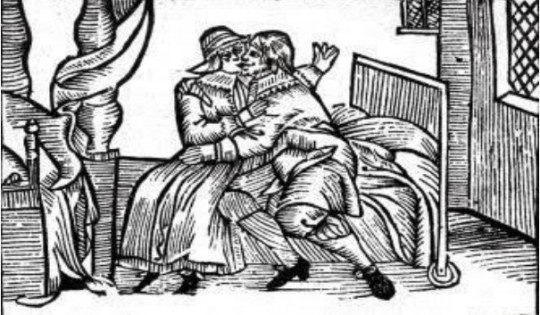
Seventeenth-century North American depiction of a fornicating Puritan couple
1680 – Legislators of New Hampshire pass the colony’s first capital laws, copied almost word for word from the Plymouth laws of 1671: If any man lie with mankind as he lies with a woman; both of them have committed abomination; They both shall surely be put to death: unless one party were forced, or were under fourteen years of age. And all other Sodomitical filthiness shall be severely punished according to the nature of it.

1822 – Rosa Bonheur, nee Marie-Rosalie Bonheur (d.1899), was a French painter, animalière and realist artist, one of few female sculptors. As a painter she became famous primarily for two chief works: Plowing in the Nivemais (in French Le labourage nivernais, le sombrage ), which was first exhibited at the Salon of 1848, and is now in the Musee d'Orsay in Paris depicts a team of oxen plowing a field while attended by peasants set against a vast pastoral landscape; and, The Horse Fair (in French Le marché aux chevaux ), which was exhibited at the Salon of 1853 (finished in 1855) and is now in the Metropolitan Museum of Art, in New York City.

Bonheur is widely considered to have been the most famous woman painter of the 19th century. Writers used to explain Bonheur's penchant for dressing in men's clothing by saying that the famous painter of animals needed disguises to paint unmolested in the markets she frequented for her subjects. It's a nice thought, but untrue. Rosa Bonheur, who lived together with Nathalie Micas for most of her life, dressed as a man because she wanted to. She drank, she smoked, she became one of the most popular painters in the world and a member of the French Legion of Honor. She was, in short, very much her own person. As she once said to a male friend who was concerned about her movement through the world of men (gasp!) unchaperoned, "Oh my dear Sir, if you knew how little I care for your sex, you wouldn't get any ideas in your head. The fact is, in the way of males, I only like the bulls I paint."

1937 – Today is the birthday of American pianist and composer David Del Tredici. Born in Cloverdale, California, he studied at Berkeley and Princeton.
Much of his early work consisted of elaborate vocal settings of James Joyce: I Hear an Army; Night Conjure-Verse; Syzygy; and a decade long obsession with the work of Lewis Carroll (Pop-Pourri, An Alice Symphony, Vintage Alice and Adventures Underground, and Final Alice, to name just a few of these works). He was awarded a Pulitzer prize in 1980 for In Memory of a Summer Day, the first part of Child Alice. Sir Georg Solti made the first recording of his epic Final Alice with the Chicago Symphony Orchestra.
Del Tredici detached himself from Carroll to write three large, dissonant works for orchestra, March to Tonality (1985), Tattoo (1986), and the threatening Steps (1990). However, the real turn in his career came in 1996, when he attended a workshop in gay sexuality and self-acceptance held by Body Electric, a national organization devoted to such workshops.
During that workshop, he set two overtly gay poems for voice and piano. This led to the composition of a number of songs based on gay texts and experiences. After attending that retreat for gay men, Del Tredici decided to integrate his sexuality into his work. For instance, a setting of Paul Monette's "Here" was dedicated to Del Tredici's lover Paul Arcomano, who died of AIDS in 1993. When he encountered Beat-era icon Allen Ginsberg at a conference, as he later related to The Advocate, Del Tredici told the poet, "I'm looking for something really dirty to set to music." Ginsberg responded by giving Del Tredici his Collected Poems, one of which, "Personal Ads," became part of a six-song cycle, Gay Life. "Personal Ads" was dedicated to gay activist Jody Dalton, director of Composers Recordings Inc.; and a setting of Thom Gunn's "Memory Unsettled" was dedicated to Del Tredici's mother, who died in 2000, and who had accepted her son's life choices. Gay Life also included poems from Paul Monette, Michael D. Calhoun, and W.H. Kidde.
These songs became the core of the cantata Gay Life (1996-2001, premiered by the San Francisco Symphony under Michael Tilson Thomas in May 2001). A related collection is Brother (1997-2001), a song cycle created with drag performance artist John Kelly, which premiered at P.S. 122 in New York in May 2001.
"I no longer want to pretend and I'm not sure what the repercussions might be," he told The Advocate. "I can survive and be a serious composer and be gay. It has fallen [to] me to do it. One generation's silence can become the next generation's nectar."
His later works have included many vocal settings of contemporary poets such as Allen Ginsberg, Thom Gunn, Paul Monette, James Broughton, Colette Inez, and Alfred Corn — often celebrating a gay sensibility (three examples: Gay Life, Love Addiction and Wondrous the Merge). OUT Magazine has twice named Del Tredici one of its people of the year.
His "On Wings of Song" was premiered in New York City in 2004 as part of the Riverside Opera Ensemble's 20th Anniversary Concert. His notable students include John Adams, Richard St. Clair and Tison Street.
Del Tredici met his life partner Ray Warman in 1999; the couple held their commitment ceremony in 2000.

Maccubbin (R) with partner Jim Bennett
1943 – Activist and former bookstore owner, Deacon Maccubbin was born on this day. Well-known as the founder and owner of Lambda Rising Books, Maccubbin has also been a supporter or founder of many gay Washington, DC institutions including youth outreach, media, the annual Pride celebrations, community social and business organizations, and the Lambda Literary Awards.
While still in the Army, Maccubbin became a gay activist, joining the Gay Liberation Front-DC briefly. In 1971, he took over a craftshop at 1724 20th St NW, turning it into the Earthworks tobacco and headshop. On June 8, 1974, Earthworks’ shelves of magazines and books became the core stock for the new Lambda Rising, one of the nation’s largest and most successful groups of gay bookstores.
As leader of the Community Building (a nickname from antiwar and counterculture days), Maccubbin turned the building into an incubator and haven for many new and struggling community groups, including the Gay Switchboard, gay youth groups, the Blade, off our backs, Roadwork, and many others.
Maccubbin was a founder and chair of the first major community group, the Washington Area Gay Community Council (WAGCC). In 1975 WAGCC launched the planning process for the second gay community center and published Just Us, the first guide to DC’s gay community. That same year, Maccubbin organized the first official Gay Pride, held on 20th St NW in front of the building.
In the 1973, he was arrested with Cade Ware and Bill Bricker from Gay Activists Alliance at a sit-in protesting police entrapment. His protests and civil disobedience continued during the 1980's in response to federal inaction on AIDS research and funding with an arrest at the White House, and in the 1990's in response to Clinton's signing the Defense of Marriage Act, as well as additional arrests at protests against apartheid at the South African Embassy and against the Pope at Catholic University.
Maccubbin has played important roles in the reform of D.C.'s sodomy law, passage of the D.C. Human Rights Act, and in responding to Bible-based attacks on homosexuality.
In 1982, he and his life partner, Jim Bennett, were among the first to celebrate a Holy Union and they were the second couple to be registered as Domestic Partners in the District of Columbia.
In 2003, Deacon saved the Oscar Wilde Bookshop in New York City (which had inspired him to launch Lambda Rising) from closing. Maccubbin commented, "The store never closed its doors. It was open right on through. Historically, that's important to me." In 2006, the bookstore was sold to a local manager.
Facing competition with online book stores, the store closed its doors on December 31, 2010. It was part of a spate of LGBT brick and mortar bookstores closures in the early 21st century, including the Oscar Wilde Bookshop in New York and A Different Light in Los Angeles and San Francisco.

1949 – Victor Garber is a Canadian film, stage and television actor and singer. Garber is known for playing Jesus in Godspell, John Wilkes Booth in Assassins, Jack Bristow in the television series Alias, Max in Lend Me a Tenor, Thomas Andrews in James Cameron's Titanic, and as Canadian ambassador to Iran, Ken Taylor, in Argo. He currently guest stars as Dr. Martin Stein on The Flash and stars as a regular on Legends of Tomorrow.
Born in London, Ontario, Garber is of Russian Jewish descent. His mother is Hope Garber, actress, singer, and the host of At Home with Hope Garber. He attended Ryerson Elementary School. He also was enrolled in the children's program of the Grand Theatre, and at age 16 he was accepted at a six-week summer theatre training program at the University of Toronto taught by Robert Gill.
Garber began acting at the age of nine, and studied at the University of Toronto's Hart House at age 16. In 1967, after a period working as a folk singer, he formed a folk band called The Sugar Shoppe with Peter Mann, Laurie Hood and Lee Harris. The group enjoyed moderate success, breaking into the Canadian top 40 with a version of Bobby Gimby's song "Canada" in 1967. The band even performed on The Ed Sullivan Show and The Tonight Show Starring Johnny Carson before breaking up.
He has worked in various American and Canadian films and television, including James Cameron's Titanic (1997), in which he used a Northern Irish accent to play the shipbuilder Thomas Andrews, and CTV's E.N.G. (1991-1993), on which he had a recurring guest role.
Other well-known appearances include Godspell (Canadian stage version, 1972, and film version, 1973) as Jesus, Sleepless in Seattle (1993), Annie (1999), Legally Blonde (2001), and Tuck Everlasting (2002).
He is most well known for his portrayal of Jack Bristow on ABC's show, Alias, for which he earned three Emmy nominations. He recently appeared on the now-canceled television series Justice on Fox and ABC's Eli Stone. His most recent TV appearance is as a mysterious character named "Olivier Roth" in 4 episodes of the Canadian science drama ReGenesis. He appeared in the third episode of the Fox series Glee as Will's father.
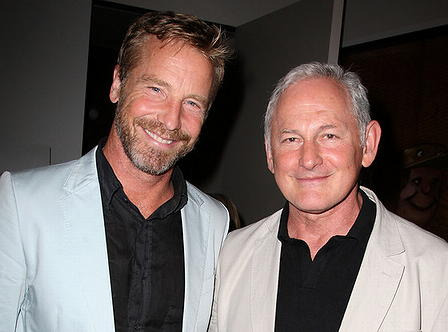
Rainer Andreesen and Victor Garber
Victor Garber has confirmed that he's a gay man and has been quietly living with his longtime partner, artist Rainer Andreesen, in New York. Garber first spoke of his relationship with Rainer to blogger Greg Hernandez, who pressed the actor to publicly confirm that he's gay after learning via Wikipedia that the 63-year-old star is partnered with a man. He asked the Garber if his partnership with Rainer had ever been made public, and noted that Garber seemed surprised by the question:
"I don't really talk about it but everybody knows," Garber told Hernandez before adding, "He's going to be out here with me for the SAG Awards." The handsome, happy couple have been together for 14 years.
On October 10, 2015, Andreesen announced on his instagram page that he and Garber were just married in Canada.

1976 – Matt Evers is an American pair skater, model and TV personality. He is the 1998 U.S. Junior champion.
With his partner Heather Allebach, Evers won the Junior pairs title at the 1998 U.S. Championships. The following season, they competed at three senior international events, 1998 Skate Canada International, 1998 Cup of Russia and 1998 Nebelhorn Trophy. He quit competing and moved to Los Angeles where he worked for a number of years before receiving an invitation to join Dancing on Ice.
Evers is currently training as a professional actor, model and spokesperson for U.S. and European manufacturers at trade shows, in commercials and print media.
Evers, who was married to a woman previously, came out as gay in January 2018 in an interview with Attitude magazine. He said it was partly the death of his uncle from AIDS and the presidency of Donald Trump that resulted in his decision to announce his sexuality publicly, saying: "I live my life by example, and I want to show young people that what you feel or how you were born isn't something bad."
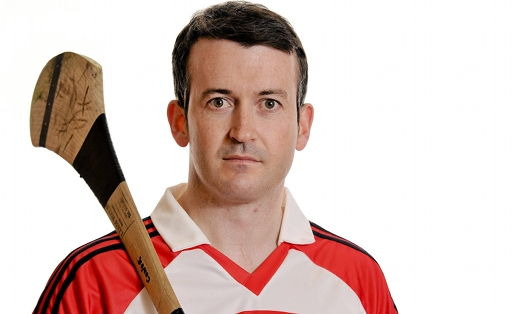
1977 – Donal Óg Cusack is an Irish hurler who played as a goalkeeper for the Cork senior team. He is current Chairman of the Gaelic Players Association. (Hurling is a kind of cross between grass hockey and football.)
Born in Cloyne, County Cork, Cusack first excelled at hurling whilst at school. He arrived on the inter-county scene at the age of eighteen when he first linked up with the Cork minor team, before later lining out with the under-21 side. He made his senior debut in the 1996 Oireachtas Tournament. Cusack went on to play a key role for Cork, on and off the field, and has won three All-Ireland medals, five Munster medals and two All-Star awards. His brother, Conor Cusack, was an All-Ireland runner-up with Cork.
Cusack represented the Munster inter-provincial team on a number of occasions in the early part of his career, winning one Inter-provincial medal on the field of play in 2005. At club level he won one championship medal with divisional side Imokilly, while he also plays with Cloyne.
Cited by many as one of the most influential inter-county players of his generation, through his championing of the cause of player welfare with the Gaelic Players Association and his innovation as a goalkeeper, Cusack became the first openly gay elite Irish sportsman in 2009.

Cusack and team-mates in traditional salutory (and very homo-erotic) stance.
Cusack has made 54 championship appearances for Cork, more than any other goalkeeper in the county's history. He announced his retirement from inter-county hurling in March 2013 after effectively being dropped from the team.
On 18 October 2009, ahead of the release of his autobiography, Come What May, Cusack disclosed to the Irish Mail on Sunday that he is gay. In Come What May he writes:
I get more out of men. Always have. I know I am different but just in this way. Whatever you may feel about me or who I am, I've always been at peace with it.
The following was serialised in the Mail on Sunday:
Since I was 13 or 14, I knew I was a bit different. I hate labels though. That's the way I am. I live with it and I am fine with it. People close to me will tell you there were never any tears. There was never agony. I just know this thing … I've had to say this to people I'm close to again and again. This is who I am. This is what I do. I spend a lot of time trying to work things out but once I know something about myself, I know it. I don't agonise. It's logical to me. I thought about this but never had any problems dealing with it.
According to Cusack, discussing his sexual orientation strengthened his bond with his fellow players. He went for a walk with then captain Seán Óg Ó hAilpín, whom Cusack had known since they were boys, and told him "the whole story, stuff that I thought he would have guessed", had "a deep and complex conversation from both sides and we came out of it like brothers."
Since then Cusack has been noted as one of the few "openly gay sporting heroes" both at home and abroad. Come What May won the William Hill Irish Sports Book of the Year for 2009

1987 – A Louisiana appellate court upholds the solicitation conviction of a man for placing his finger through a glory hole in a bookstore and then placing his mouth at the hole, without saying a word.
1998 – Pope John Paul II asks God for forgiveness for the inactivity and silence of some Roman Catholics during the Holocaust.

13 notes
·
View notes